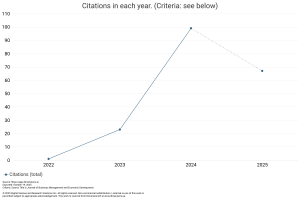Job Enjoyment in High-Risk Job: A Study on Window Cleaners
DOI:
https://doi.org/10.59653/jbmed.v3i02.1519Keywords:
Job enjoyment, Jobers' personal interests, The job itself, Fun, accomplishmentAbstract
This study aims to examine the phenomenon of job enjoyment among window cleaners at PT ISS Indonesia, located in South Jakarta. This qualitative research adopts a case study approach, involving six window cleaners as informants and one supervisor as a key informant to provide additional insights into job enjoyment. Data were collected through observation, interviews, and documentation and analyzed using data triangulation. The findings indicate that several factors influence employees’ job enjoyment, including the level of enjoyment experienced, structured training programs, a positive job environment, and flexible job hours, all of which impact employees’ decisions to stay or switch jobs. Additionally, mood and workplace challenges serve as motivational factors, encompassing personal interests, the nature of the job itself, and the sense of fulfillment or achievement. The study reveals that while most employees enjoy their jobs, some do not fully experience job satisfaction within their role or job environment.
Downloads
References
BBC News. (2019, July 22). Window cleaner broke back in hospital fall. BBC News. https://www.bbc.com/news/uk-wales-49069633.
Centers for Disease Control and Prevention (CDC). (1996). Jober falls from 40 feet while cleaning windows. National Institute for Occupational Safety and Health (NIOSH). https://www.cdc.gov/niosh/face/stateface/ne/96ne020.html.
Creswell, J. W., & Poth, C. N. (2018). Qualitative inquiry and research design: Choosing among five approaches (4th ed.). SAGE Publications.
Csikszentmihalyi, M. (1990). Flow: The psychology of optimal experience. Harper & Row.
Daley, D. M. (2017). Job satisfaction versus job engagement: A comparative analysis on perceptions of accountability and intent to leave public service. International Journal of Organization Theory & Behavior, 20(2), 196–219. https://doi.org/10.1108/IJOTB-20-02-2017-B002.
Deci, E. L., & Ryan, R. M. (2000). The “what” and “why” of goal pursuits: Human needs and the self-determination of behavior. Psychological Inquiry, 11(4), 227–268. https://doi.org/10.1207/S15327965PLI1104_01.
Erdianza, D., Tentama, F., & Sari, D. P. (2020). The effect of job-life balance and job enjoyment on organizational citizenship behavior with job satisfaction as a mediating variable. International Journal of Scientific and Technology Research, 9(4), 1734–1738. https://eprints.uad.ac.id/20146/.
Hasibuan, M. (2020). Manajemen: Dasar, Pengertian, dan Masalah. Jakarta: Bumi Aksara.
Herzberg, F. (1966). Work and the Nature of Man. Cleveland: World Publishing.
Ismail, M. (2020). Keselamatan kerja dalam profesi berisiko tinggi. Pustaka Mandiri.
Judge, T. A., Locke, E. A., Durham, C. C., & Kluger, A. N. (2001). Dispositional effects on job and life satisfaction: The role of core evaluations. Journal of Applied Psychology, 86(1), 80–92. https://doi.org/10.1037/0021-9010.86.1.80.
Judge, T. A., Thoresen, C. J., Bono, J. E., & Patton, G. K. (2001). The job satisfaction–job performance relationship: A qualitative and quantitative review. Psychological Bulletin, 127(3), 376–407. https://doi.org/10.1037/0033-2909.127.3.376.
Lee, D. C., Hung, L. M., & Huang, S. C. (2012). Does job enjoyment and organizational support affect emotional labor? Journal of Business Research-Türk, 4(2), 5–29. https://isarder.org/index.php/isarder/article/view/68/65.
Lingard, H., Cooke, T., & Blismas, N. (2017). Safety climate in high-risk professions: A study of window cleaners. Journal of Safety Research, 62, 85–95. https://doi.org/10.1016/j.jsr.2017.06.003.
Locke, E. A. (1976). The nature and causes of job satisfaction. In M. D. Dunnette (Ed.), Handbook of Industrial and Organizational Psychology (pp. 1297–1349). Rand McNally.
Miles, M. B., Huberman, A. M., & Saldaña, J. (2014). Qualitative data analysis: A methods sourcebook (3rd ed.). SAGE Publications.
Parker, S. K., Morgeson, F. P., & Johns, G. (2020). The motivational impacts of challenging job: Perspectives from high-risk jobs. Academy of Management Journal, 63(2), 439–466. https://doi.org/10.5465/amj.2018.0233.
Purwanti, B. E. (2020). Pengaruh perceived organizational support dan job enjoyment terhadap intensi job hopping pada karyawan generasi milenial. Thesis. Fakultas Psikologi, Universitas Airlangga. https://repository.unair.ac.id/98458/.
Sedarmayanti. (2021). Manajemen sumber daya manusia: Reformasi birokrasi dan manajemen pegawai negeri sipil. Bandung: Refika Aditama.
Van Wingerden, J., Derks, D., & Bakker, A. B. (2018). Facilitating work engagement through strengths-use and job crafting: A longitudinal study. Journal of Occupational Health Psychology, 23(2), 246–259. https://doi.org/10.1037/ocp0000088.
Wibowo, A. (2019). Keselamatan kerja dan standar ketinggian profesi berisiko. Graha Ilmu.
Wibowo, A. (2021). Kesehatan dan keselamatan kerja di lingkungan industri. Graha Ilmu.
Window Digest. (2021). Window cleaning accident statistics. Window Digest. https://windowdigest.com/window-cleaning-accident-statistics.
Zacher, H., & Frese, M. (2018). Job design and job satisfaction in physically demanding professions. Journal of Occupational Health Psychology, 23(1), 77–89. https://doi.org/10.1037/ocp0000105.
Downloads
Published
How to Cite
Issue
Section
License
Copyright (c) 2025 Oby Ziherlan, Chandra Arifianto

This work is licensed under a Creative Commons Attribution-ShareAlike 4.0 International License.
Authors who publish with this journal agree to the following terms:
- Authors retain copyright and grant the journal right of first publication with the work simultaneously licensed under a Creative Commons Attribution-ShareAlike that allows others to share the work with an acknowledgement of the work's authorship and initial publication in this journal.
- Authors are able to enter into separate, additional contractual arrangements for the non-exclusive distribution of the journal's published version of the work (e.g., post it to an institutional repository or publish it in a book), with an acknowledgement of its initial publication in this journal.
- Authors are permitted and encouraged to post their work online (e.g., in institutional repositories or on their website) prior to and during the submission process, as it can lead to productive exchanges, as well as earlier and greater citation of published work (See The Effect of Open Access).





























